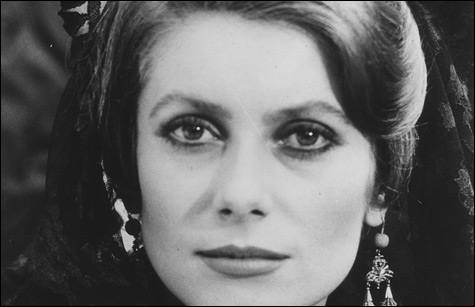
TRISTANA: Deneuve’s recounting of the mundane details of filmmaking only enhances the magic of good movies. |
The onslaught of DVD extras, and the sort of PR disguised as journalism that’s practiced on shows like Entertainment Tonight and in publications like Vanity Fair, has resulted in making coverage of moviemaking more widespread — and less real — than ever. Close Up and Personal: The Private Diaries of Catherine Deneuve isn’t a great book, and readers whose appetite for juice is whetted by that subtitle are going to be disappointed. Deneuve has been in the public eye long enough to know — especially in a culture where gossip functions as pornography — that only damn fools reveal themselves to the public. But a real person emerges in these pages, and, through that restrained self-portrait, so does the process of making movies.
The mundanity of what Deneuve records functions as its own form of demystification. You get the sense in these diaries of people working in conditions that are good or adverse, of the boredom of waiting for lighting, the chore of getting the right make-up or costumes. And this demystification makes you realize just how mysterious, how fortunate, it is when a good movie results from this process. Truffaut once said that at the beginning of a shoot he hoped to make a great movie and that by the middle he was hoping to make a movie. There’s no particular despair evident in Up Close and Personal, but that same sense of “who the hell knows?” comes through.

The diaries Deneuve has included were kept during the shoots for both good movies (Waris Regnier’s East-West, Luis Buñuel’s Tristana) and lousy ones (Stuart Rosenberg’s 1969 romantic comedy The April Fools, Lars von Trier’s Dancer in the Dark). There’s also a diary of her harried experience on the jury at the Cannes Film Festival — which only proves that film festivals are no place to judge movies.
There are movies I’d have preferred to read about, such as Jacques Demy’s Les demoiselles de Rochefort|The Young Girls of Rochefort, in which she starred with her sister Françoise Dorléac, shortly before Dorléac was killed in a car crash. (In an interview with Pascal Bonitzer, Deneuve alludes to the devastation she felt: “It’s hard to talk about the challenges of being an actress, unless you have a close actress friend, which I don’t, and I realised how much I was missing Françoise, how much I missed being able to share in the way you only can when you’re personally close and do the same kind of work.”) Or Leos Carax’s mad and maddening Pola X, in which Deneuve seems to exist only for us to drink in her glamor. (The few lines she writes on the film are perceptive: “Carax would do well to work with a scriptwriter, but there aren’t enough scriptwriters anymore, because unfortunately, they all become directors.”) Or any of her collaborations with André Téchiné.